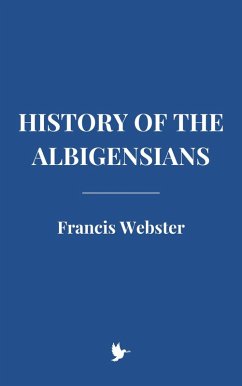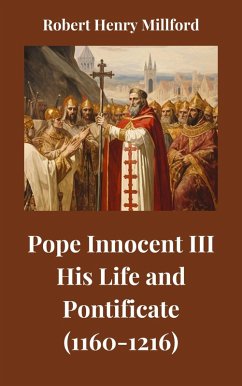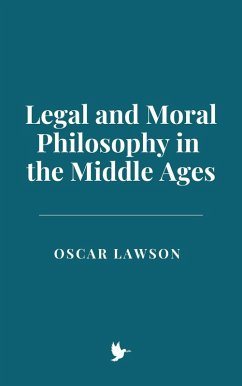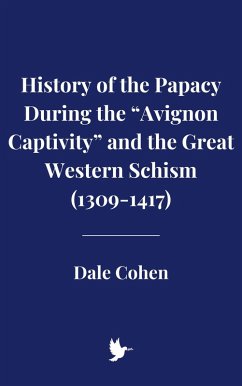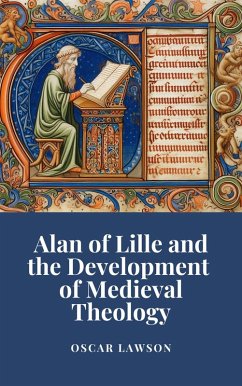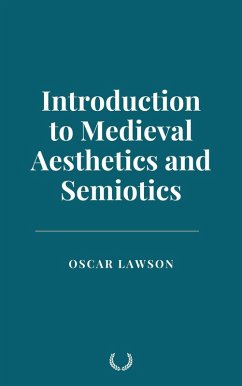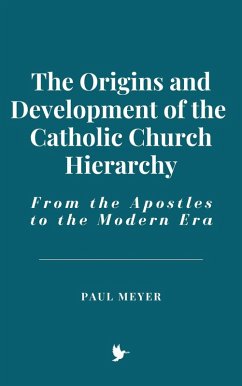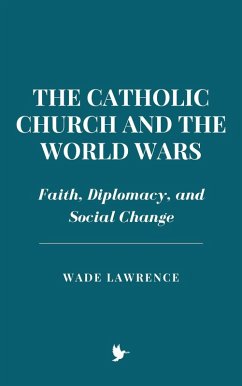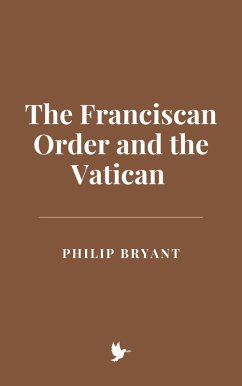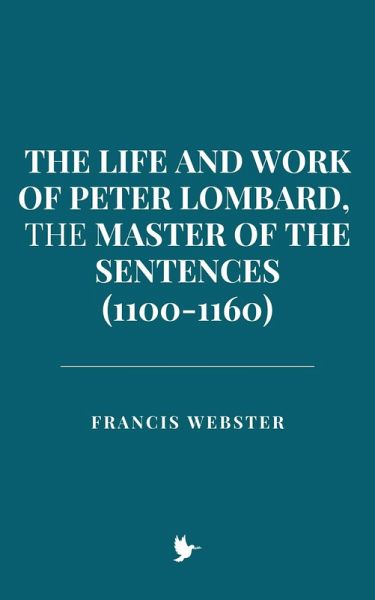
The Life and Work of Peter Lombard, the Master of the Sentences (1100-1160) (eBook, ePUB)

PAYBACK Punkte
0 °P sammeln!
This book explores the life, works, and theological legacy of Peter Lombard (ca. 1100-1160), a pivotal figure in the development of medieval scholastic theology. Lombard's most significant contribution to Christian thought is his monumental work, The Four Books of Sentences, which became the standard theological textbook in medieval universities for centuries. Through a systematic and comprehensive treatment of Christian doctrine, Lombard laid the groundwork for later theological developments, especially in the area of sacramental theology.The book begins with an exploration of Peter Lombard's...
This book explores the life, works, and theological legacy of Peter Lombard (ca. 1100-1160), a pivotal figure in the development of medieval scholastic theology. Lombard's most significant contribution to Christian thought is his monumental work, The Four Books of Sentences, which became the standard theological textbook in medieval universities for centuries. Through a systematic and comprehensive treatment of Christian doctrine, Lombard laid the groundwork for later theological developments, especially in the area of sacramental theology.
The book begins with an exploration of Peter Lombard's early life and education, his rise to prominence in Paris as a theologian, and his appointment as Bishop of Paris. His intellectual environment is analyzed, particularly his relationships with major figures like Hugh of Saint Victor and his intellectual engagement with the scholastic method.
The heart of the book focuses on Lombard's theological masterpiece, The Sentences, which systematically addresses a wide range of theological topics, including the Trinity, Christology, creation, sin, grace, and salvation. A particular emphasis is placed on Lombard's sacramental theology, where he clearly defines the seven sacraments-baptism, confirmation, the Eucharist, penance, extreme unction, holy orders, and matrimony. His articulation of sacraments as visible signs of invisible grace and their efficacy became central to Catholic teaching and practice, laying the foundation for later doctrinal definitions, including those of the Council of Trent.
This book also includes analytical chapters that delve into Lombard's theology, drawing on key quotations from The Sentences. These sections examine the theological nuances of each sacrament, Lombard's views on grace, and the impact of his work on sacramental practice in the medieval Church. Several case studies are presented, illustrating how Lombard's sacramental theology influenced ecclesiastical debates, particularly on issues such as the validity of marriage and the role of confession and penance.
Additionally, the book examines the reception of Peter Lombard's work by later theologians, including Thomas Aquinas, Bonaventure, and John Duns Scotus, who engaged with The Sentences in their own theological writings. Lombard's influence extended into the Reformation and Counter-Reformation periods, where his sacramental teachings were both defended and critiqued. His work was a focal point in the theological debates of the Council of Trent, which reaffirmed much of his sacramental theology in response to Protestant challenges.
The final sections of the book reflect on Lombard's legacy in modern theology, particularly how his approach to systematic theology and his definitions of the sacraments continue to influence contemporary Catholic thought. The book concludes by affirming Peter Lombard's enduring place as a master of medieval theology, whose influence shaped not only the scholastic tradition but also the broader history of Christian doctrine.
This work provides a comprehensive examination of Peter Lombard's contributions to medieval theology, with a particular focus on his sacramental theology, while also addressing the broader intellectual and ecclesiastical context of his time.
The book begins with an exploration of Peter Lombard's early life and education, his rise to prominence in Paris as a theologian, and his appointment as Bishop of Paris. His intellectual environment is analyzed, particularly his relationships with major figures like Hugh of Saint Victor and his intellectual engagement with the scholastic method.
The heart of the book focuses on Lombard's theological masterpiece, The Sentences, which systematically addresses a wide range of theological topics, including the Trinity, Christology, creation, sin, grace, and salvation. A particular emphasis is placed on Lombard's sacramental theology, where he clearly defines the seven sacraments-baptism, confirmation, the Eucharist, penance, extreme unction, holy orders, and matrimony. His articulation of sacraments as visible signs of invisible grace and their efficacy became central to Catholic teaching and practice, laying the foundation for later doctrinal definitions, including those of the Council of Trent.
This book also includes analytical chapters that delve into Lombard's theology, drawing on key quotations from The Sentences. These sections examine the theological nuances of each sacrament, Lombard's views on grace, and the impact of his work on sacramental practice in the medieval Church. Several case studies are presented, illustrating how Lombard's sacramental theology influenced ecclesiastical debates, particularly on issues such as the validity of marriage and the role of confession and penance.
Additionally, the book examines the reception of Peter Lombard's work by later theologians, including Thomas Aquinas, Bonaventure, and John Duns Scotus, who engaged with The Sentences in their own theological writings. Lombard's influence extended into the Reformation and Counter-Reformation periods, where his sacramental teachings were both defended and critiqued. His work was a focal point in the theological debates of the Council of Trent, which reaffirmed much of his sacramental theology in response to Protestant challenges.
The final sections of the book reflect on Lombard's legacy in modern theology, particularly how his approach to systematic theology and his definitions of the sacraments continue to influence contemporary Catholic thought. The book concludes by affirming Peter Lombard's enduring place as a master of medieval theology, whose influence shaped not only the scholastic tradition but also the broader history of Christian doctrine.
This work provides a comprehensive examination of Peter Lombard's contributions to medieval theology, with a particular focus on his sacramental theology, while also addressing the broader intellectual and ecclesiastical context of his time.
Dieser Download kann aus rechtlichen Gründen nur mit Rechnungsadresse in A, B, CY, CZ, D, DK, EW, E, FIN, F, GR, H, IRL, I, LT, L, LR, M, NL, PL, P, R, S, SLO, SK ausgeliefert werden.




